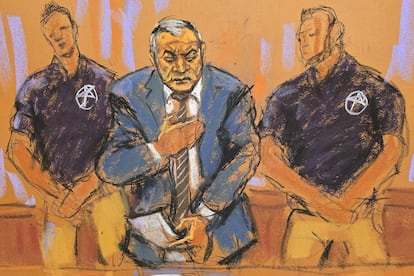US takes down Mexico’s former drug czar: Genaro García Luna sentenced to 38 years in prison for taking cartel bribes
Convicted last year of collaborating for two decades with the Sinaloa Cartel, he learned his fate in the same court and before the same judge who convicted El Chapo. In a statement, he insisted on presenting himself as a victim

Mexico’s former drug czar was escorted by two U.S. marshals to learn his fate. Genaro García Luna wore a dark suit, as he did when he was the Secretary of Public Security and a man trusted by former President Felipe Calderón. He placed his notes on the table and stared at the sheets of paper, as he silently reviewed each word he was about to say in his head. All eyes in the courtroom were on him: the architect of the war on drugs was sitting for the last time in the dock for collaborating for more than two decades with the Sinaloa Cartel, and risked spending the rest of his life in prison.
García Luna did his best not to look defeated as he spoke in court for the first time to defend his innocence, and to defend his legacy for the last time. Suddenly, without his being able to prevent it, the myth of the super-cop, of the all-powerful politician, of the ex-official who had under his command almost 40,000 men and who made organized crime a television spectacle, collapsed. Judge Brian Cogan sentenced him to 38 years and four months in prison and also imposed a $2 million fine.
The sentencing hearing for the 56-year-old former official, once considered one of the most powerful and feared men in Mexico, took place in the Eastern District Court of New York — the same court and before the same judge who convicted Joaquín El Chapo Guzmán in October 2019. García Luna has been the highest-ranking Mexican politician to ever set foot in a U.S. court. He will also be the first high-ranking official to serve a sentence in a U.S. prison.
Just a few minutes after five o’clock, García Luna rose from his seat and began to speak. “I know this is not the time to defend my innocence, but this is the first time I am speaking publicly,” he said in a solemn tone. There was not a trace of remorse. He remained cool, as if delivering a political speech, although there were a couple of moments when his voice cracked. “I allowed myself to send you a letter where I lay out for you my family life, my ethics and my convictions, my life story,” he said. “I have not committed any of these crimes.”
García Luna insisted on playing the role of the victim. He said that he was in jail because of a “plot” orchestrated by the Mexican government, that there was not a single piece of evidence against him, that his case was driven by “political interests.” He complained bitterly about the conditions he faced in prison and repeated the syrupy tale of how he dedicated the last few years to helping and teaching other prisoners in jail. He believed that dozens of international awards and decorations could save him. He bragged, once again, about his connections at the highest level in the United States: the photos with famous politicians, the dinners with diplomatic representatives, the halo of protection he thought he had that even led him to seek U.S. citizenship. But he didn’t realize he was just sinking deeper.

After a five-week trial in February of last year, the jury’s verdict was unanimous. García Luna was convicted of five felonies in the Brooklyn court: three for conspiracy to traffic cocaine, one more for participating in an ongoing criminal enterprise and another for giving false statements to authorities. The sentencing, originally scheduled for June of last year, was delayed at least five times due to requests by his lawyers for a retrial. Judge Brian Cogan rejected the request last month after prosecutors uncovered that the former secretary offered bribes of up to $2 million to other inmates to testify on his behalf.
Once again, Cogan did not hesitate and issued a historic sentence for Mexico. García Luna’s legal team, led by César de Castro, defended his client’s innocence and announced that he will appeal the conviction. The Mexican president, Claudia Sheinbaum, called the ex-official “cynical,” after he sent a letter to the judge in which he asked for clemency once more, accused the Mexican government of fabricating “false information” and criticized the judicial reform promoted by former president Andrés Manuel López Obrador. Sheinbaum also lashed out at Calderón and challenged him to make a statement on the case. “We want to see what he says,” she said in her morning conference.
After the ex-secretary, it will be Ismael El Mayo Zambada, co-founder and kingpin among kingpins of the Sinaloa Cartel, who will sit in the dock in New York this week, once again in Judge Cogan’s court. Following the fall of El Chapo and García Luna, the trial against Zambada, captured in late July, is shaping up to be the next judicial thriller starring Mexico’s drug lords in the United States.
Sign up for our weekly newsletter to get more English-language news coverage from EL PAÍS USA Edition
Tu suscripción se está usando en otro dispositivo
¿Quieres añadir otro usuario a tu suscripción?
Si continúas leyendo en este dispositivo, no se podrá leer en el otro.
FlechaTu suscripción se está usando en otro dispositivo y solo puedes acceder a EL PAÍS desde un dispositivo a la vez.
Si quieres compartir tu cuenta, cambia tu suscripción a la modalidad Premium, así podrás añadir otro usuario. Cada uno accederá con su propia cuenta de email, lo que os permitirá personalizar vuestra experiencia en EL PAÍS.
¿Tienes una suscripción de empresa? Accede aquí para contratar más cuentas.
En el caso de no saber quién está usando tu cuenta, te recomendamos cambiar tu contraseña aquí.
Si decides continuar compartiendo tu cuenta, este mensaje se mostrará en tu dispositivo y en el de la otra persona que está usando tu cuenta de forma indefinida, afectando a tu experiencia de lectura. Puedes consultar aquí los términos y condiciones de la suscripción digital.









































